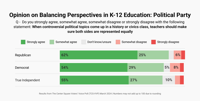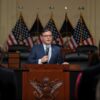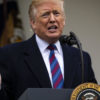Are Republicans gaining ground on education? Poll indicates voters want balance

(The Center Square) – Republicans may be gaining ground on national education issues during a presidential election year, responses from voters in a new nationwide poll reveal. The results also show that most voters want schools to fairly present controversial issues in school.
The Center Square Voter’s Voice Poll, conducted by Noble Predictive Insights, found voters reject ideas associated with progressive politicians and are concerned with fairness and equal political perspectives in schools.
The poll of over 2,000 likely voters nationwide found that the majority of true independents (62%) and Republicans (64%) are unhappy with public schools in the U.S. Fewer than half of Democrats, 44%, said the same.
The Voter’s Voice Poll found that 85% of likely voters say that when controversial topics come up in class, teachers should ensure to discuss both sides of the issue equally.
The poll also found that most likely voters (87%) want schools to focus on math, reading and science and a majority (51%) disagree with teaching critical race theory in K-12 schools.
A poll of voters in battleground states conducted last year by Democrats for Education Reform found that voters favored Republicans over Democrats on education issues by three percentage points, citing pandemic learning loss.
David Byler, chief of researcher at Noble Predictive Insights, said those poll results highlight how Republicans are gaining ground on education issues where Democrats have historically held advantages.
“You find that for a long, long time, Democrats have had an advantage on education,” Byler said. “Voters really preferred them and thought of them as the party that was best equipped to handle schools, education policy and related areas.”
“We’ve seen a significant shift in recent polling where Republicans are catching up on this issue at a fairly rapid rate,” Byler said.
Byler said the first reason Democrats are dipping in popularity comes from their association with COVID-19 lockdowns and the learning loss that came with them.
“Those policies, while popular at first, became less popular over time with the general public, and I think that was the first blow to Democrats’ historic advantage on education,” Byler said in an interview.
The second reason for Democrats dropping behind in the polls is tied to the cultural issues playing out in many school board rooms nationwide, Byler said.
“Some parts of the activist Democratic base have been picking unpopular cultural fights in the classroom and in schools,” Byler said. “They’re now seeing the public push back against them and warm more and more to Republicans on education because of that.”
Debates over critical race theory and parental notification policies for student gender changes have roiled communities.
While advocates say critical race theory is not taught in classrooms, some administrators and teachers say concepts like privilege and intersectionality should be discussed in class. LGBTQ+ advocates also say students should be able to change their gender, name and preferred pronouns at school without telling their parents, citing privacy and safety concerns.
However, a large proportion of voters (59%) do not support school staff withholding a student’s gender changes from parents. Just over half of independent voters were against critical race theory being taught in K-12 education.
Byler said that Democrats’ waning popularity has been a gradual change.
“Nobody just got out of bed and started thinking, ‘Man, Republicans are so much better at teaching reading.’ That’s not what happened,” Byler said. “What happened was that there were lockdowns that people believed went on for too long and kept kids out of school for too long, and there are cultural fights where voters broadly are on the opposite side of the progressive activists.”
“What voters really want is balance when these debates come up,” Byler said.

There were 85% of likely voters who agreed with the statement, “When controversial political topics come up in a history or civics class, teachers should make sure both sides are represented equally,” the poll found. Support remained high across all political parties.
“I think that was one of our most positively affirmed statements – that when a political argument comes up that is germane to social studies or whatever type of class, they want the teacher and faculty to provide balance and to make sure that both sides are represented,” Byler said. “That’s a very popular belief.”
The poll also found that 56% of likely voters think teachers and administrators too often push a liberal agenda in the classroom compared with 37% who said they push a conservative perspective.
“You see that there is a significant chunk of the electorate that is concerned that the liberal position is overrepresented in classes, and there’s a much smaller chunk of the population that is worried about conservative perspectives being overstated,” Byler said.
While the biggest issues hurting Democrats on education are the effects of school closures related to the COVID-19 pandemic and the cultural debates, Byler said voters do pay attention to what perspectives are presented in class.
“Normal voters care about schools functioning well and basic fundamental values like fairness, so a significant number of voters are concerned that teaching in classrooms is unfair,” Byler said.











